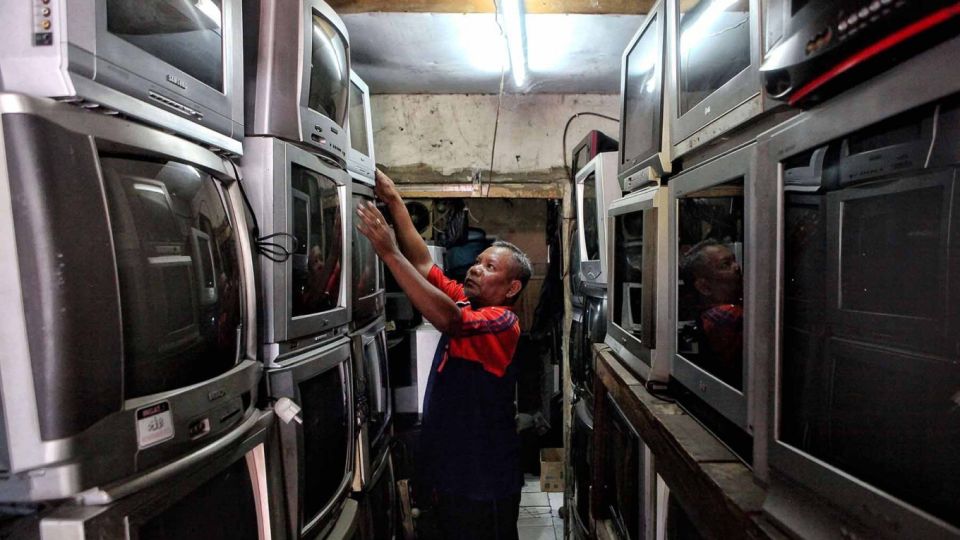October 7, 2022
JAKARTA – The Communications and Information Ministry has once again postponed the analog switch-off (ASO) program for Jakarta, leading experts to question whether digital television broadcast in Indonesia will be feasible in time.
The ministry initially decided on Sep. 23 that the implementation of the Greater Jakarta ASO was to take place on Oct. 5 as it considered the region to be the best prepared, having fulfilled three preparedness parameters.
The preparedness parameters consist of the existence of analog television that would be signed off, the readiness of the region to migrate to digital television and whether the government-assisted provision of digital set-top boxes (STBs) for low-income households in the region has been carried out.
However, the Indonesian Private Television Station Association (ATVSI) declared that the preparations were not yet complete.
“The ATVSI and directors of private broadcasting institutions [LPS] requested that the Greater Jakarta ASO scheduled for Oct. 5 be called off and proceed instead on Nov. 2 instead, simultaneously with other regions in Indonesia,” said Post and Informatics Management Director General Ismail on Wednesday.
“Upon that request, [it was decided that] the Greater Jakarta ASO be postponed and held simultaneously on Nov. 2, at 12 a.m.,” he added.
To justify the ministry’s judgment on its initial deadline for Greater Jakarta, Ismail told the press that of some 460,000 low-income households in the region, 96.4 percent had received STBs.
“One of the reasons for the postponement request is the real conditions, the objective conditions [on the ground],” said ATVSI secretary-general Gilang Iskandar.
Gilang cited a report from United States information, data and market measurement firm Nielsen Holdings, which found that of 21 million televisions owned by Greater Jakarta households, only 40 percent were digital ready.
Sigit Puspito Wigati Jarot, head of national telematics infrastructure at the Indonesian Telematics Society (Mastel) said that if the data the ATVSI had on the public’s preparedness was accurate, then postponing the ASO was the wise choice.
“The ATVSI has the data on real conditions that show people’s preparedness level is still low, although the government said that the STB distribution had already reached its target,” said Sigit.
“For future evaluation, in determining the ASO schedule, [all parties involved] must be on the same page on every aspect of preparedness parameters, so the schedule won’t get dragged behind again,” he added.
Furthermore, he noted that from the technical point of view, the ASO is the act of deactivating analog broadcasting, so technically, carrying out the ASO on the new deadline of Nov. 2 was feasible. However, he said that what needed to be considered was the impact and associated risks. “Those aspects need to be dealt with carefully.”
Problems with multiplexing tender
Indonesia ICT Institute executive director Heru Sutadi told The Jakarta Post that the decision making on the deadline was not the real problem as it had already involved members of the public, related associations, academics and experts, but the issue rather lay at the door of the multiplexing tender for the STBs.
“The questionable aspect is the commitment from the multiplexing tender for STB provision. […] If everyone had gotten hold of [STBs], they could migrate to digital television already, but the fact is they have not,” Heru said.
“The provision of STBs from the government is different from that carried out through the multiplexing tender. From what I’ve heard, [the number of STBs provided] from the tender is still low,” he added.
Nonetheless, the ATVSI declared the previous commitment it had with the communications minsitry regarding provision of STBs still stood at the agreed amount, namely 4.2 million units, whereas the government would provide another 1 million.
“[Considering how people are not ready yet], we need more time, at least for the next month, to massively publicize this [program] with the ministry so people will transition [to digital] immediately by having an STB or digital television set receiver,” said Gilang.
“The ATVSI and associated LPS declared their willingness and commitment to carry out all technical steps of the ASO preparation, namely widespread publicity, distribution of STBs for low-income households and their installation, for people entitled to that assistance,” Ismail said.
This was not the first time the communications ministry delayed the program as it had done so twice previously.
In August last year, the ministry decided to ditch the entire initial plan and draw up a new one in three phases, which resulted in another cancellation as the first phase that was meant to be executed on April 30 did not go according to the plan, almost a total failure.
The ministry revealed that TVRI is currently building multiplexing infrastructure for 22 regions that have not yet received digital broadcasting services, funded by the state budget.


